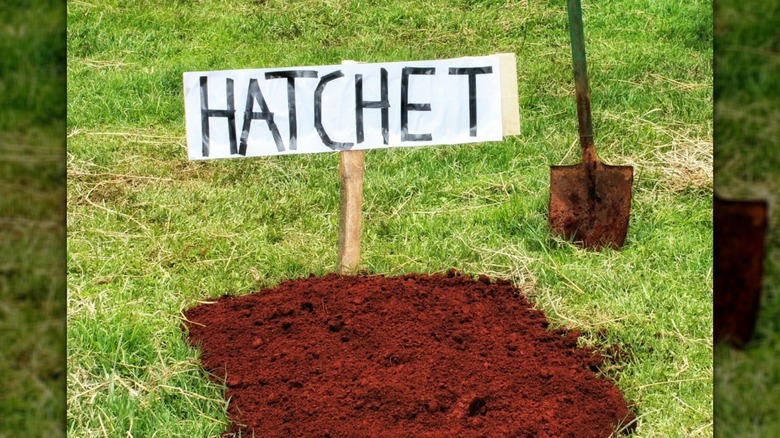The Real Reason We Say 'Bury The Hatchet'
We've all heard the phrase "bury the hatchet," which means to leave the past behind or make peace with your enemies. The saying, however, has an interesting origin that entailed burying a hatchet — literally. The gesture was done by Native Amercians from North America. According to lore, two leaders were able to unite five nations — Seneca, Cayuga, Onondaga, Oneida, and Mohawk — and form a confederacy (via History Extra). To signify peace, two chiefs were said to have buried their weapons under a white pine tree.
The practice became a tradition, and tribal chiefs completed a peace agreement by burying a hatchet to signify harmony between their tribes. Per The Straight Dope, settlers and missionaries recorded instances of the tradition in their journals. One entry from 1644 reads, "Proclaim that they wish to unite all the nations of the earth and to hurl the hatchet so far into the depths of the earth that it shall never again be seen in the future."
Other records of burying the hatchet
There is another record of an instance of burying the hatchet, this time written by Samuel Sewall, who served as a judge during the Salem witch trials. The writing was dated in 1680 and says, "I wrote to you in a letter of the mischief the Mohawks did; which occasioned Major Pynchon's going to Albany where meeting with the Sachem, they came to an agreement and buried two axes in the ground, one for English and another for themselves." He further wrote that the literal burying of the hatchet was more binding than any peace contract between the two parties, as the hatchet was their main weapon (via Shelby County Today).
Throughout the years, the phrase "bury the hatchet" was used not just by tribes, but by countries as well. In the late 1700s, a 1794 peace treaty between the U.K. and the U.S. happened, and with it, Lord Grenville received a letter from statesman John Jay, which said, "To use an Indian expression, may the hatchet be henceforth buried for ever, and with it all the animosities, which sharpened, and which threatened to redden it."
Today, although the meaning of burying the hatchet is still the same as it once was, the act of literally burying a hatchet is no longer done.

